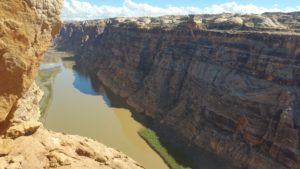I’d like you to consider something: that we are conduits, and not end states.
For the most part, humans and other animals (to the extent that animals are self-conscious) consider themselves as end states. For each individual, its own survival is paramount. Even if we think of others, we often do so secondarily, as means to the end of our own survival or happiness. To the lion, the gazelle is a meal. To a conman, the mark is a meal ticket.
Yet we’re also conduits. In a way, human beings and other living bodies are vessels for the transportation of matter and energy around the planet. We act as transfer devices for moving mass and energy from one point to another within the biome. In the past, organisms acted as unconscious agents to achieve balance within an environment. If there were too many of a certain prey species, and it threatened to crash the biome within which that group operated, then predators helped rebalance the ecosystem by culling the prey that threatened to throw everything out of balance. Until our arrival as a species, this balance was more or less maintained. When great imbalances occurred, Gaia, the earth as an organism, found ways to wipe the slate clean through mechanisms like mass extinctions. Balance was restored.
Organisms didn’t realize it, of course, but they acted as agents of balance, moving food and waste, mass and energy from one part of the earth to another. The evolution of our species changed this dynamic in two ways. First, we realized that we were conduits, at least some of us did. Second, we destroyed the balance. And we destroyed the balance because most of us continued to see ourselves the way other organisms do: as ends, whose survival justified any means deployed to survive and thrive.
Yet at their highest levels of awareness, humans do realize that we are each channels, and not the end in itself. Look at the Prayer of St. Francis. It begins like this: Lord, make me a channel of your peace. If you’d rather not think of God or prayer as having a role in all this, that’s fine. Then look at pure, random biology. Trees represent the whole, but they are obviously composed of parts, of roots and a trunk and limbs and branches and twigs and leaves. Each of these parts seems alive in its own right, and each part may be alive. But no part can survive on its own. Each element of a tree acts on behalf of the greater whole. Each part of a tree transports water and nutrients and in a sense breathes and drinks for the whole. In our own bodies, cells are living things, yet they produce energy and remove waste and distribute these products and byproducts throughout the whole body, for the benefit of the whole. In fact, these cells don’t have an existence independent of the whole and couldn’t survive without it.
The observation that parts serve as conduits for the whole isn’t confined to things we regard as alive. Rivers transport nutrients and waste, moving mass from one point on the globe to another. So do the currents in oceans and lakes and the vast atmospheric gyres which circulate on a global scale. Even the plumbing of the earth – its tectonic plates and volcanoes – circulates planetary energy in the form of heat, recycling rock waste by pumping it deep into the planet’s interior, where the rock is metamorphized into something else before it’s recirculated back to the surface through the process of eruption. So you see, everything is a conduit, a vessel, a means to an end. Even in the larger cosmos, this process of recycling and recirculation takes place, with stars cooking gasses into plasmas, then eventually exploding in novae, which form great gas clouds that accrete into stellar nurseries and planetary bodies, where life has evolved on at least one such body as a means of efficient redistribution of matter and energy on its planetary surface.
We humans are in a unique position. We realize this process takes place. We observe it. And we forget it. And by forgetting that we’re conduits, by seeing ourselves instead as end states for which the whole was designed, we wreck the whole.
That from which we evolved, the animals, must survive. And by focusing on their own survival, their forms and behaviors are perfected through the engine of evolution. Yet then evolution produced us. And the very self-interest which survival through natural selection requires has begun to defeat the process of evolution. We are destroying ourselves and the planet which gave rise to us.
Some believe that evolution is purposeful, though most evolutionary biologists might say that its mechanisms are entirely random. Regardless of your own beliefs, humans are in a unique position to understand both evolution’s processes and its ends. And that end, I maintain, is balance. Yet the same brains which allow us to understand that balance are also responsible for creating the imbalances which threaten the earth today.
A change is required. Instead of yoking our powers to the instinct to survive, we have the opportunity to ‘step out of evolution.’ We can see ourselves, not as ends which the system called earth is meant to serve. But rather as means, as conduits of balance meant to keep the system called Gaia in balance and harmony.
The choice is ours.
© 2022 by Michael C. Just
Mike’s book, Fermi’s Paradox: An Inquiry into the Ends of Civilization, can be found on this website and is available for free.

